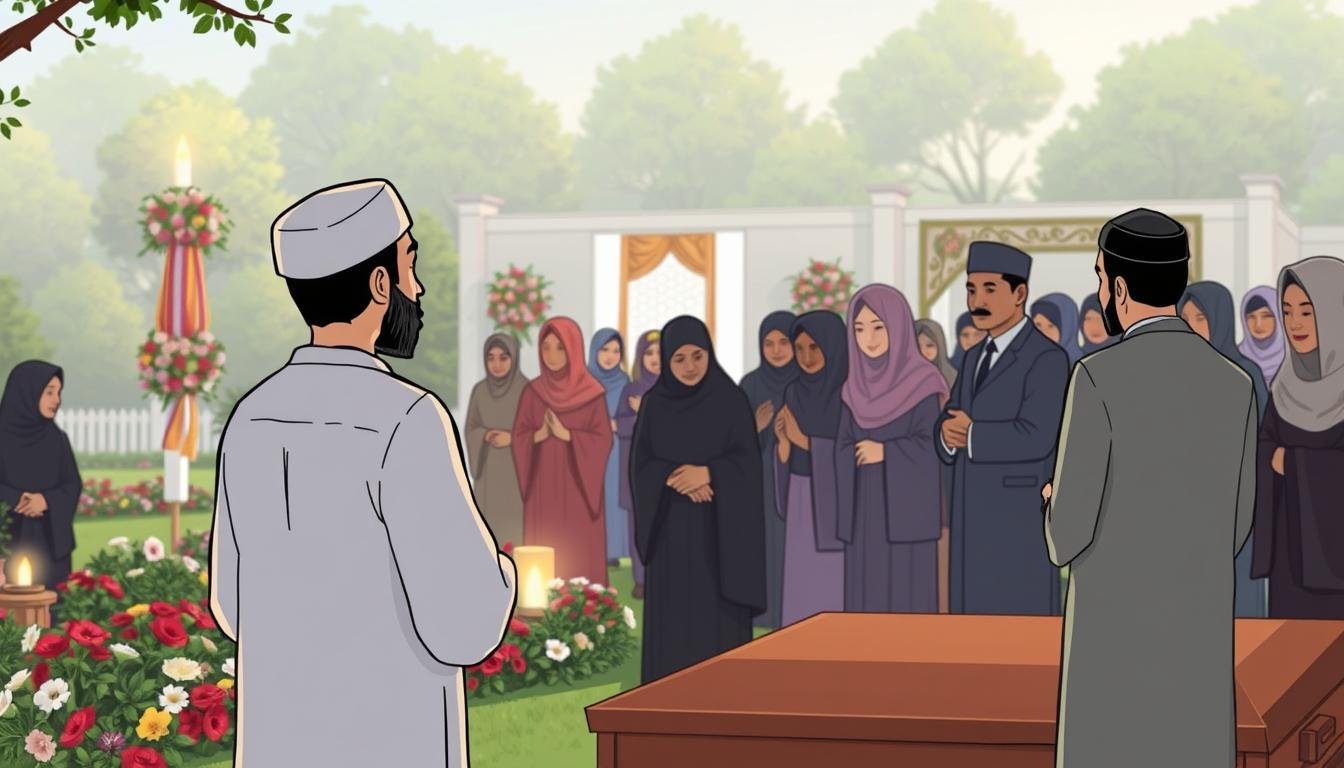Have you ever thought about the mix of faith and family when going to non-Muslim funerals? This is a big question in places like the United States. Here, people from different faiths often face challenges in understanding each other’s beliefs.
When Muslims decide to go to funerals of non-Muslims, it brings up important points. It’s a tough choice, whether it’s for family or friends. Let’s look into the rules of funeral behavior and how Islamic teachings guide us. What moral questions do we face when making these choices?
Understanding Islamic Teachings on Funeral Attendance
Islamic teachings say it’s important to attend funerals. It shows respect and care for the person who has passed away and their family. The Quran teaches us to treat everyone with kindness and respect, as seen in Al-Israa (17:70).
Prophet Muhammad showed us the value of mourning. He was deeply sad when his son Ibrahim died. He even showed respect for a Jewish funeral, as told in Al-Bukhari. This teaches us to be kind and compassionate, even at funerals.
The Prophet taught us five key rights, and attending funerals is one of them. This shows how much Muslims value honoring the dead. Even if the person was not Muslim, the Prophet showed respect, like with his uncle Abu Talib.
Umar gave advice to walk ahead of a Christian funeral, showing respect. The Quran tells us to be fair and just to everyone, as in Al-Mumtahanah (60:8). This helps us understand and respect different beliefs. So, attending funerals is about showing respect and following our faith.
Can Muslim Attend Non Muslim Funeral
Many Islamic scholars have different views on Muslims going to non-Muslim funerals. Some say it’s okay under certain conditions. But others warn against it to keep away from things that go against Islam.
A Muslim can help with washing and burying a non-Muslim relative. This shows respect for family and kindness. It matches what the Quran says in Surah al-Mumtahanah (60): 8 about being just and kind to non-Muslim relatives.
Hadith from Sahih al-Bukhari tells us to be good to our non-Muslim parents. Legal opinions, like those from al-Majmūʿ (5: 89), say some participation is okay. But we must stick to our Islamic values.
But, we must not join in rituals that go against Islam, like cremation. The Prophet Muhammad didn’t go to his Uncle Abu Talib’s funeral. This shows there are big religious reasons to think about.
It’s important to be kind to family while following our Islamic beliefs. Going to non-Islamic funerals might seem like we respect their beliefs. So, the debate about Muslims at non-Muslim funerals is about being kind, respecting family, and staying true to our faith.
The Importance of Kindness and Family Ties
Maintaining family ties is key in Islam. It shows the religion’s focus on kindness and compassion. This principle helps Muslims act with respect during times of loss, even with non-Muslim family members.
Keeping relationships strong with all family members shows respect for the deceased. This is true, no matter their faith or beliefs.
Showing Respect to Non-Muslim Family Members
When we lose someone, kindness in Islam shines through. Saying sorry and showing sympathy follows Islamic teachings. It shows respect for the deceased, no matter their faith.
Offering comfort shows we value family ties. It brings us together in our sorrow. This way, Muslims can show their faith while dealing with tough emotions. The importance of kinship obligations goes beyond faith, calling for compassion towards all relatives.
Islamic Perspective on Kinship Obligations
Islamic teachings, like Hadiths by Imam al-Bukhari, highlight the duty to keep family bonds strong. One saying is, “And whoever believes in Allah and the Last Day, let him maintain the bonds of kinship.” This shows family ties and kindness are essential for peace.
Muslims are urged to build strong family bonds. This can bring blessings like more food and longer life. These teachings show kindness in Islam can bridge gaps between different beliefs. It helps us live together in peace and respect.

Permissibility of Attending Non-Muslim Funerals
Going to non-Muslim funerals is a tricky issue in Islam. Muslims must balance showing love for family and following their faith. Knowing the rules and conditions helps in this tricky area.
General Rules for Muslim Attendance
Islam teaches kindness and compassion, even to those who are not Muslim. Muslims can offer condolences and join the funeral procession. But, they must avoid actions that go against their faith.
Conditions for Participation in Funeral Activities
Islamic rules say to be careful when joining funeral activities. Attending can show respect for the person who has passed away. But, it’s important to stay true to one’s beliefs.
Muslims can show sympathy without joining in non-Islamic rituals. It’s all about being respectful and staying true to your faith. This balance is key when dealing with funerals.
Prohibited Actions During Non-Muslim Funerals
Islamic teachings stress the need to follow certain rules at funerals, even for non-Muslims. Taking part in un-Islamic rites can harm one’s faith. Knowing these rules helps Muslims stay true to their beliefs, even when dealing with non-Muslim family or friends.
Involvement in Un-Islamic Rites
Muslims should not do things that go against their faith, like joining in non-Muslim rituals or prayers. The Prophet Muhammad didn’t go to his non-Muslim uncle’s funeral. This shows the need to keep religious beliefs separate.
Doing actions that show you agree with non-Muslim beliefs can be seen as wrong. Scholars say kindness is important, but not at the cost of faith. They advise against joining in practices that go against the Quran and Hadith.
Guidance from Hadith and Quran
The Quran and Hadith give Muslims important advice on non-Muslim funerals. They say it’s okay to be kind to non-Muslim family, but with caution. It’s important to not join in un-Islamic practices.
Religious leaders say it’s wrong to help with a non-Muslim’s burial unless there’s no other choice. They stress the need to respect family while staying true to Islamic values.
Interfaith Relations and Funeral Attendance
Going to funerals of other faiths is tough. It shows goodwill and helps us understand each other better. Being respectful is key to building strong ties with people from other religions.
This respect lets us honor different traditions while staying true to our faith. It’s all about finding a balance.
Understanding Cultural Sensitivity
Being culturally sensitive at funerals shows we value respect and understanding. Joining in non-Muslim rituals might make us wonder about our faith. But it’s a chance to talk and learn from each other.
By doing this, we can get closer to our loved ones. Talking openly about our beliefs helps us grow together. It makes our experiences richer for everyone.
Impact on Relationships with Non-Muslim Friends and Family
When we share grief with non-Muslims, our bonds can grow stronger. Going to funerals shows we care and are there for them. It brings us closer as a community.
Being empathetic is important. We must respect our beliefs while being open to others. This balance is key to building strong relationships. For more on interfaith challenges, check out this resource.

Case Studies: Muslim Attendance at Non-Muslim Funerals
Looking into Muslim attendance at non-Muslim funerals shows a mix of rules and personal choices. Scholars give different views on when it’s okay to go. These views help Muslims in many places decide what to do.
Guidelines from Islamic Scholars
Islamic scholars have different ideas about going to funerals. Most say women can go, but it’s not always the best choice. The Malikis say elderly women can go, and younger women if there’s no trouble.
The Hanafis are more careful. They usually don’t want women to join the funeral. This shows how important it is to think about the situation and what others do.
Real-life Experiences of New Muslims
Converts to Islam face big choices about funerals. They struggle with following Islamic rules and keeping family ties. Their stories show the hard decisions they make.
These stories also show how important talking together in the community is. It helps everyone understand each other better during tough times.
Alternative Ways to Support Non-Muslim Friends in Grief
Supporting friends in grief can be tough, with cultural and religious differences. Muslims might look for ways to support that fit their beliefs. This way, they can show real care without giving up their faith.
Offering Condolences without Attending
Not being able to go to a non-Muslim funeral doesn’t mean you can’t show you care. Offering condolences is a great way to do this. You can send a card, make a call, or even flowers. These actions show you’re thinking of them and care about their feelings.
How to Be Present Without Participation
Being there for your friends in their grief is important. You can talk to them, listen, or share happy memories. This kind of support helps your friendship grow, even if you can’t be at the funeral.
Emotional and Spiritual Considerations
Going to interfaith funerals can stir up different feelings for Muslims. It’s hard to mix personal beliefs with family duties. This situation makes us think about both family bonds and our spiritual health.
Balancing Personal Beliefs with Family Needs
Dealing with family expectations during a loss can make Muslims feel guilty or conflicted. Some experts say it’s okay to go to non-Muslim funerals to support others. But, it’s key to remember the emotional well-being of our loved ones first.
Finding ways to grieve that respect our beliefs is important. Many turn to private prayers or reflection. This keeps their faith strong while showing care for those mourning.
Coping Mechanisms During Interfaith Funerals
Grief touches on deep emotional and spiritual levels, leading Muslims to seek help. The 1-877-WHY-ISLAM hotline is there to support those dealing with loss. It helps understand the emotional side of mourning a non-Muslim loved one.
It’s important to find healing practices. Talking about feelings or joining in communal prayer can help. These actions help us deal with the challenges of interfaith funerals without losing our spiritual balance.
Community Attitudes Towards Interfaith Funerals
Community views on interfaith funerals among Muslims show a mix of beliefs. These beliefs come from cultural backgrounds and personal views. Many Muslims see interfaith relations as a way to build unity and respect.
They believe attending a non-Muslim funeral can help bridge gaps. This is true for those who value relationships with people of other faiths. It shows how important it is to keep connections, even when beliefs differ.
On the other hand, some Muslims stick to Islamic rules against non-Muslim funeral customs. They believe in keeping faith pure during hard times. This view highlights the importance of following religious teachings.
Exploring these different views helps us understand the community better. It shows the variety of thoughts within it. This diversity enriches our discussions and helps us grow together.
By understanding these views, we can act with respect for others’ beliefs. This dialogue helps us see our shared humanity. It’s key to have open talks to address our beliefs and duties in society.
FAQ
Is it permissible for a Muslim to attend a non-Muslim funeral?
What do Islamic teachings say about attending funerals of non-Muslims?
How do I balance my Islamic obligations with family obligations during a non-Muslim funeral?
What are the general rules for Muslims attending funerals of non-Muslims?
Are there specific conditions that allow Muslims to participate in non-Muslim funeral activities?
What actions are prohibited for Muslims during non-Muslim funerals?
How can attending a non-Muslim funeral affect interfaith relations?
What guidelines do Islamic scholars provide regarding attending non-Muslim funerals?
What alternatives can Muslims consider to support grieving non-Muslims without attending their funerals?
What emotional considerations should Muslims keep in mind during interfaith funerals?
How do community attitudes toward interfaith funerals vary among Muslims?

Embracing Faith, One Insight at a Time!
The teachings of the Quran have always guided my path. With a deep passion for Islamic knowledge, I strive to blend the wisdom of tradition with the relevance of today, making the timeless messages of Islam accessible and meaningful for everyone.
Muslim Culture Hub is my platform to share historical insights and thought-provoking articles, exploring both well-known and lesser-discussed aspects of Islamic culture and beliefs. My mission is to create an inclusive online space where everyone can learn, strengthen their faith, and connect with the profound message of Islam.
Join the journey!
May peace be upon you.








